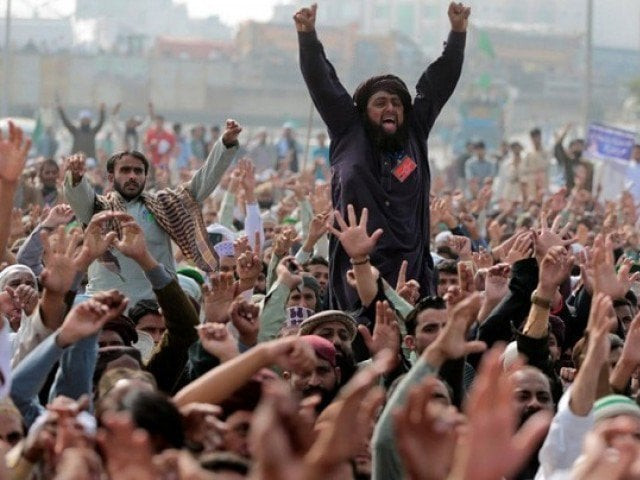Post-truth politics and the anti-fragile state
Constantly adding words to our lexicon: the resistance, fake news and post-truth politics

TLP protests. PHOTO: REUTERS
Regarding Clinton’s testimony, Joe Lockhart, the then White House deputy press secretary remarked, “There was a sense over that time that the entire story was not known and this was the time when we found out what really happened. We had a new reality to deal with.”
Not much has changed in well, ever, in terms of truth and politics. Yet as our society evolves — or devolves, depending on your perspective — we are constantly adding words to our lexicon: the resistance, fake news and post-truth politics. As per my understanding, the resistance is a collection of people, somewhere, doing something to rebel against something or someone else. I was recently told by a friend on Twitter that I am “going to trigger the resistance” in Pakistan — I choose to take that as a compliment. Fake news is, well, reasonably self-explanatory. Post-truth politics is a culture where debate is framed by appeals to emotion disconnected from details of policy, and the constant repetition of talking points to which factual, counter-arguments are ignored. A Google search of Belgium’s recently resigned PM, Charles Michel, reveals his coalition government fell prey to post-truth politics centered around migration policy disagreements and (his camp claims) opponents’ efforts to promote alternative versions of Michel’s stance. The digital domain has become the primary battleground for alternative facts, and lies, so much so that The Economist had ‘The Art of the lie’ as its cover title for the September 2016 issue. And The Guardian frequently reminds online readers that “factual, trustworthy journalism is under threat.”
And as I write this, I recall writing a research paper in 1995 on Cyber Anarchy, and find it incredibly fascinating that life has had a way of bringing me back to a part of the world known for being at the epicentre of The Great Game — the struggle for Empire in Central Asia — and how so many seem fixated on promoting their version of alternative facts in Pakistan, particularly on social media.
One particular group, who recently met in Washington, DC, likes to bill themselves as ‘intellectuals’ of South Asian descent who are against terrorism and for human rights. On the surface of it, it seems like a good idea and a worthy cause to support. This year’s group included a former diplomat who was granted a guarantee by Asma Jahangir on the Supreme Court (and never returned to Pakistan), and others who claim to have been attacked or survived attempted kidnapping by Pakistan’s powerful agencies. Claiming political asylum, one attendee states he managed to elude 10-12 would-be attackers and escaped to France. These are serious and deeply disturbing scenarios that should be thoroughly investigated.
However, when asked basic questions, such as: who funds these gatherings? Are the speakers qualified to tackle matters of counter-insurgency? Did the participants acknowledge Pakistan’s efforts in arresting recent religious extremists immobilising the streets of Islamabad and Lahore in protest against the Asia Bibi verdict? One of the self-proclaimed ‘victims’ and participants in the conference decided to issue unfounded attacks against me, claiming that I am a paid propagandist. Trivialising important questions, distraction by attack, seems all too common by these folks especially considering they claim to defend human rights.
What possible motivation could the speakers have — particularly if they claim they don’t “wish ill” for Pakistan and this forum is to “save Pakistan from clutches of military authoritarianism and façade of democracy”?
Published in The Express Tribune, December 23rd, 2018.
Like Opinion & Editorial on Facebook, follow @ETOpEd on Twitter to receive all updates on all our daily pieces.














COMMENTS
Comments are moderated and generally will be posted if they are on-topic and not abusive.
For more information, please see our Comments FAQ